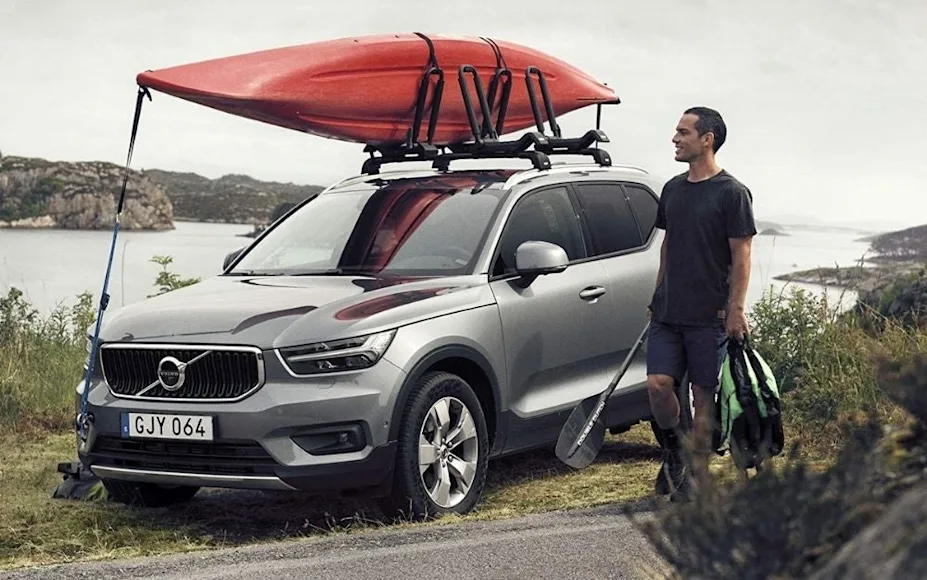_We may earn revenue from the products available on this page and participate in affiliate programs. Learn more ›
_
Best Budget
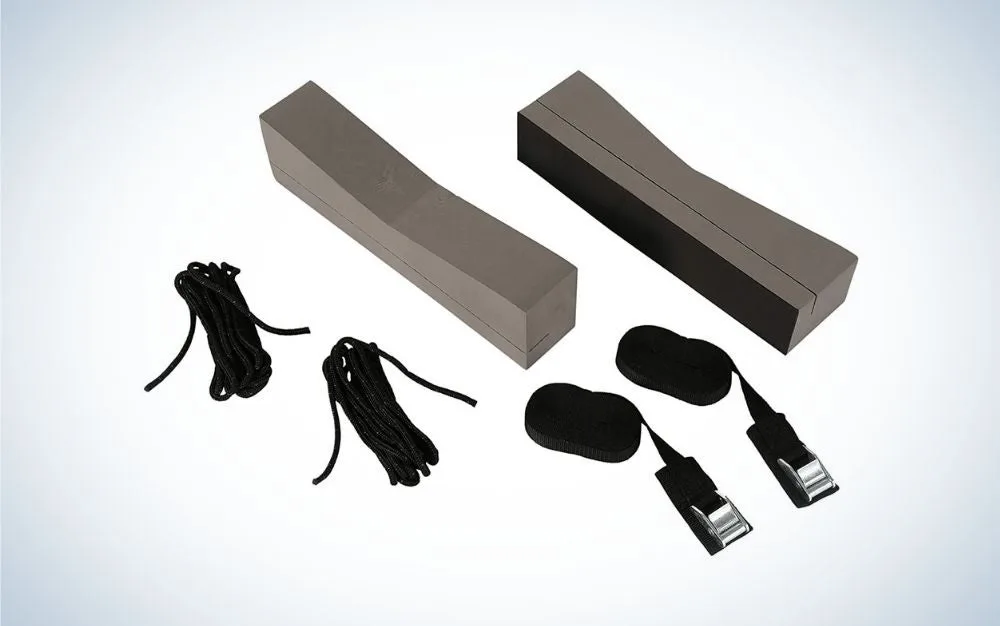
Attwood Universal Rack Free Car Top Kayak Carrier
Best Overall
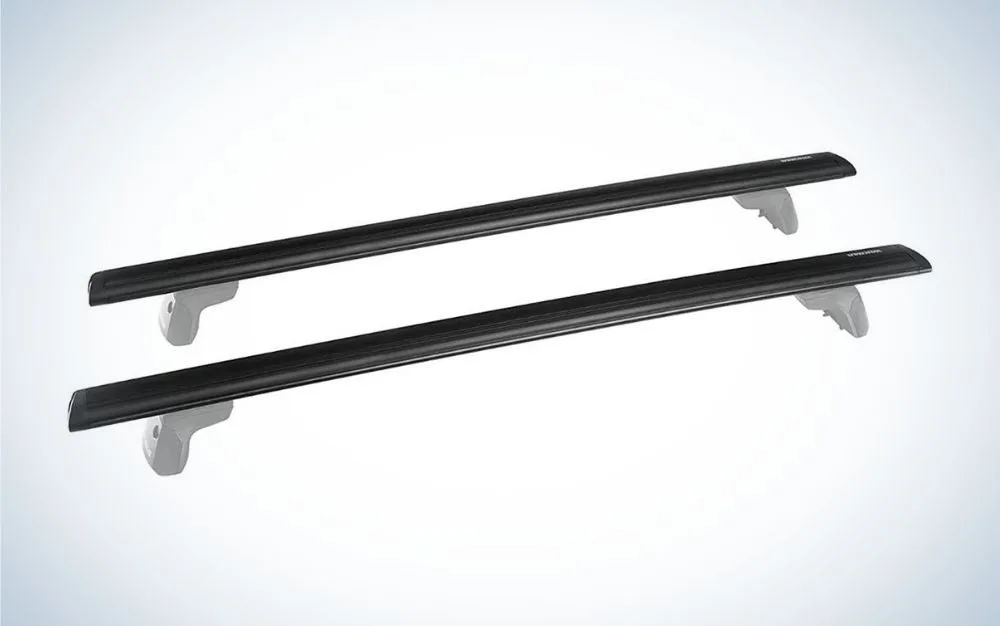
Yakiama JetStream
Best for Trucks

Yakima Overhaul HD
Once you find the fishing kayak
of your dreams, the next step is to make sure transporting the boat doesn’t turn into a nightmare by having the best kayak roof rack for your needs. Loading and safely carrying a heavy fishing kayak on a kayak car rack requires special roof racks. Then, tying down the boat and securing it to the car takes special care to avoid a catastrophic accident. Kayak fishing is a lot of fun, but safely transporting the boat is serious business.
Best Overall: Yakima JetStream
Best Vertical: Thule Hull-a-Port Pro
Best with Load Assist: Malone Telos XL Load Assist
Best for Trucks: Yakima Overhaul HD
Best Budget: Attwood Universal Rack Free Car Top Kayak Carrier
How We Picked the Best Kayak Roof Racks
The best kayak roof racks were chosen according to what best fit the categories with functionality, durability, and customer satisfaction in mind. When products cannot be tested by the writer firsthand, we consult trusted colleagues that have experience with the product, conduct in-depth company and product research, and use our industry-specific knowledge. Products and categories are subject to change as updates are performed, and new products are tested.
The Best Kayak Roof Racks: Reviews & Recommendations
Best Overall: Yakima JetStream
Best Overall

Specs
Materials: Aluminum
Dimensions: 62.5″ x 3.25″ x 1″
Weight: 8.5 lbs
Mount Type: Roof Rails
Pros
Less noise than round bars (vehicle dependant)
Relatively versatile installation
Durable
Available in three sizes
Cons
Not as high of weight capacity as steel bars
Installation can be confusing
Famous for sturdy construction and good looks, Yakima’s JetStream Aero Bars and Big Catch saddles carry on the reputation for the heaviest fishing kayaks. The BaseLine towers are easy to install and locking inserts keep the expensive rack on the car. JetStream aero bars have a 165-pound weight capacity and reduce noise and wind resistance. Paired with the BigCatch saddles, the channels and cleat make tie down easy and secure.
Best Vertical: Thule Hull-a-Port Pro
Best Vertical
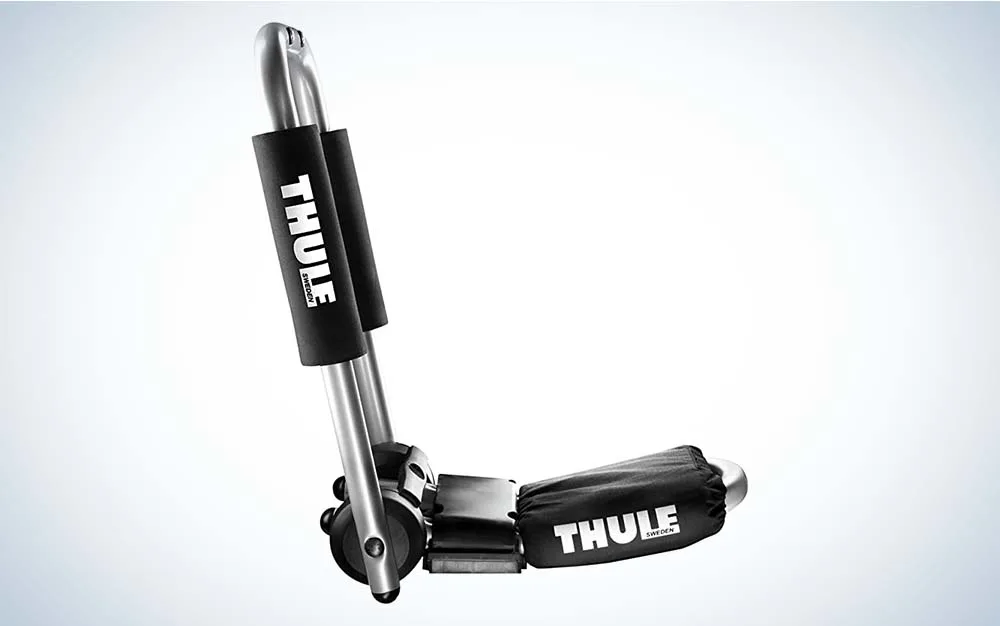
Specs
Load Capacity: 75 lbs
Dimensions: 20.3″ x 7.7″ x 15.1″
Weight: 12.6 lbs
Mount Type: Crossbars
Pros
Comes with straps and padding
Compatible with round bars and most crossbars
Can fold down when not in use for better clearance
Durable
Cons
Installation instructions are not clear
Could improve locking system to prevent theft
Looking for a double kayak roof rack, you’ll probably need a J-cradle rack with high capacity and sturdy construction. Thule’s Hull a Port Pro can do the job. The universal mount fits any rack and the J-cradle folds out of the way between fishing trips. Thule also offers a similar design with their Hull-a-Port rack. The main difference between these racks is that the Pro can fold down, which was a major complaint from customers using the traditional Hull-a-Port rack.
Best with Load Assist: Malone Telos XL Load Assist
Best with Load Assist
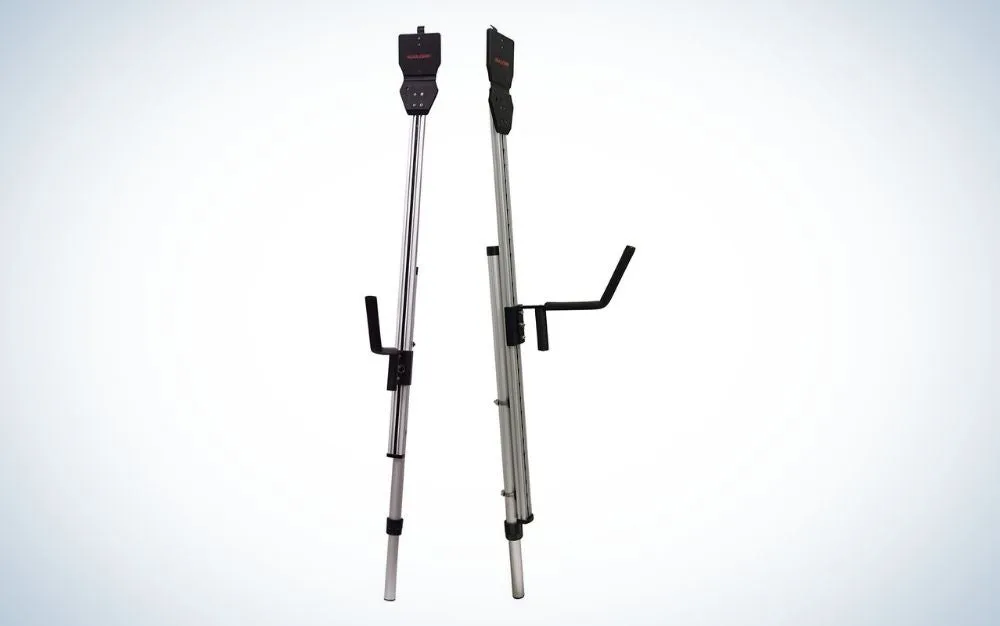
Specs
Materials: Alloy Steel
Dimensions: 60″ x 10″ x 7″
Weight: 19 lbs
Mount Type: Temporarily attaches to j-style carrier
Pros
Makes it easier to load kayaks alone
Easy assembly and dismantle
Ground level adjustments
Does not scratch or damage vehicle
Cons
Each one is sold separately
Not tall enough for all vehicle heights
If you have to get a heavy kayak onto a kayak car rack, then Malone’s Telos XL Load Assist system is your friend. For the ultimate in support, the load assist rails drop from the rack to the ground. This allows the J-cradles to drop lower making it easier to load the kayak. Once on the load assist bars, push the kayak up and onto Malone’s matching J-cradles or horizontal saddles. Detach the load assist system and use it with any matching Malone rack. Store the Telos XL in the trunk between uses.
Best for Trucks: Yakima Overhaul HD
Best for Trucks

Specs
Materials: Aluminum
Dimensions: 27″ x 19.25″ x 15″
Weight: 50.54 lbs
Mount Type: Truck bed
Pros
Fits most truck beds
Easy to take on and off
Durable construction
Integrated tie-down points
Cons
Requires YAKIMA HD Bar crossbar (sold separately)
With a whopping 500 pound capacity (300 pounds off road) Yakima’s Overhaul HD roof rack combined with HD Overhaul crossbars and Big Catch saddles can carry your kayaks anywhere. Accepts all Yakima accessories with side bars to add even more gear. Easy to install and removes quickly. Oversized and over engineered to be as tough as your truck.
Best Budget: Attwood Universal Rack Free Car Top Kayak Carrier
Best Budget

Specs
Materials: foam blocks, polypropylene rope, vinyl-coated clips
Dimensions: 18″ x 8″ x 5″
Mount Type: Strap
Pros
Affordable option
Works on any vehicle
Very simple system
Shouldn’t damage car when used properly
Cons
Can cause dents in roof when foam blocks are placed too close together
Time consuming to secure
May need additional straps for some vehicles
Use Attwood’s Universal Rack Free Cart Top Kayak Carrier with a factory rack, aftermarket system, or on the cartop for a quick and inexpensive way to transport a fishing kayak. It is a simple system, but it can be very time-consuming (especially if you’ve never used a system like it before). While it works well with almost any vehicle, the main downside is that if it isn’t installed correctly, it can damage the roof of the car (dents). To prevent this, make sure the foam blocks are far enough apart. Overall, it is a reliable, affordable system for people that don’t transport kayaks often or want a cheap alternative to a traditional kayak roof rack.
What to Consider When Choosing a Kayak Roof Rack
A sit on top kayak is easy to use and fun to fish, but transporting and storing the kayak can be a pain in the neck. The best kayak roof rack makes the job easier and safer.
The best way to transport a kayak is in the bed of a full-size pick-up truck. The next best bet is a small trailer, which is low to the ground for easy loading and better gas mileage.
If you will be transporting your kayak on the roof of your car or truck, then carefully consider the type of rack you choose. First, calculate the weight of your kayak and gear and compare it to the weight limit of the roof rack. A factory roof rack usually has a weight limit below the weight of the average fishing kayak.
For the safest and easiest method of kayak transport on a car or truck roof, look for an aftermarket roof rack and saddles. A quality roof rack for kayak has a higher weight capacity with sturdy construction to survive the wear and tear of transporting a fishing kayak. The best kayak roof racks can be paired with a variety of accessories to securely carry your kayak.
The best kayak roof rack can be configured to fit any car or truck. You’ll need to purchase towers, the supports that attach the rack to your roof. The towers will match the model of your car, factory roof rails or kayak roof rack for cars without rails. Then, match the towers to crossbars rated to carry the weight of your kayak.
Once you have the towers and crossbars, you’ll need saddles to carry the kayak. For a heavy fishing kayak, we recommend low-profile, heavy-duty saddles. Lighter kayaks can be carried elevated on a J-cradle to load two kayaks on a narrow car roof.
To make loading easier, the best kayak roof rack for kayak can be rigged with a load-assist system. Some systems use a bar to support the bow of the kayak while the operator lifts the stern and pushes the boat onto the roof rack. Other systems allow the owner to load the kayak on a lowered platform and lift the boat onto the rack. Not only do load assist mechanisms help lift the kayak to the roof, they also protect the car from damage from the kayak.
Finally, to secure the boat to the roof rack, use one-inch web straps. Then tie the bow and stern to the front and rear bumper with 550 paracord.
Once the kayak is on the rack and tied down, shake, pull and push the boat to make sure it is secure. Losing a kayak on the road would be a complete disaster.
Are you looking for the best kayak rack?
Carrying a kayak on the roof of a car is a heavy responsibility. The best kayak roof rack is overbuilt to shoulder to task. Sturdy aluminum cross bars should not bend under the weight of a heavy fishing kayak. Look for aerodynamic crossbars that reduce wind vibration and noise. The towers should easily fit any car top and keep the cross bars low to the roof for better fuel efficiency. The best kayak roof rack can be rigged with a variety of accessories and attachments to hold any size and style kayak. Most important, the best kayak roof rack makes it easy to secure the kayak to the rack with tie-downs and channels to hold the straps and tie-downs. Most of all, you want a roof rack that makes transport safe and easy.
Do you need a vertical kayak rack for your car?
with a friend is twice the fun, so anglers are looking for the best kayak roof rack with a vertical kayak rack. This type of kayak rack is called a J-cradle because the kayak sits vertically in the hook of the J. Angling the boats allows the owner to fit two kayaks on one car. This double kayak roof rack system is most popular with whitewater and touring kayaks. J-crates make a great platform for a standup paddleboard, too. Kayak weight is the biggest limitation. It is more difficult to lift a heavy kayak onto a J-cradle. And, driving down the road with a big fishing kayak sticking up like a giant plastic sail will have a negative effect on your fuel economy. To carry a fishing kayak, be sure the J-cradle’s weight limit is sufficient. Don’t be afraid to use a step stool and a friend to load the boat. The best set-up uses a J-cradle to carry one boat and horizontal kayak saddles to carry the second boat.
Would a load assist roof racking system be the best kayak rack for you?
The average weight of a fishing kayak is well over 70 pounds, and most boats are 12 feet long and three-feet wide. An angler could use some help loading his fishing kayak onto a kayak rack for car. To the rescue, load assist roof racking systems. These systems come in two types: loading bars and lifting systems. A loading bar extends from the rack. The operator places the bow of the kayak on the bar then lifts the stern into the rear saddles. Once the stern is seated, lift the bow into the front saddles. After the boat is loaded, the bar retracts into the rack. The system requires a little more strength, but it is the quickest way to load a kayak on a car roof rack. For extra help loading a kayak, place the boat in a lifting system and push it up and onto the roof rack. A lifting system uses rails stretching from the rack to the ground. Load the kayak in the J-cradle and push it up the rails to the rack. A lifting system takes more time but removes any effort from the process.
Will you carry a kayak on the best kayak rack for truck?
A full-size pick-up truck is the perfect vessel for transporting a fishing kayak. Just drop the tailgate and load the boat into the hold. But sometimes the hold is full of gear with no room for the kayak. That’s when you need the best kayak rack for truck. Holding a heavy kayak (or two kayaks) high over the truck bed requires a sturdy rack system. Look for towers that can be mounted anywhere on the truck bed. The crossbars should accept a variety of accessories such as rod holders and gear baskets. Most important, the rack should be easy to remove to fit in a parking garage.
Is budget your biggest consideration when choosing the best kayak rack?
With all the fancy kayak rack for car, thrifty anglers have a budget choice to get them to the water. While an aftermarket system is the best kayak roof rack, a simple set of foam blocks and straps is a cheap roofrack. Foam blocks work fine on any factory roof rack. Or, use foam blocks with an aftermarket rack. Slide the blocks over the crossbars and use one-inch web straps to secure the boat to the rack. Or, you can use the foam blocks without a rack. Simply place the blocks on the roof and use straps and ropes to secure the kayak to the car. While foam blocks aren’t as secure as conventional kayak saddles, they’ll get the job done.
FAQs
Q: How do you transport a kayak with a roof rack?
You can transport a kayak with a roof rack A sit on top kayak can be loaded with the seat up. A canoe or sit-inside kayak should be loaded with the hull up to keep the boat from filling with rain water. Strap the kayak to the roof racks with a one-inch web strap. Tie the bow and stern to the front and rear bumper with 550 paracord.
Q: How far apart should roof racks be for a kayak?
The answer is easy. Center the kayak on the rack so the kayak logo is between the bars. With a sit-on-top kayak, it’s best to line up the cross bars with the kayak scuppers. Moving the bars too far apart could cause the plastic to warp. Spacing the bars too close together not secure.
Q: Can you stack two kayaks on a roof rack?
Can you stack two kayaks on a roof rack? Can you stack four kayaks on a roof rack? When it comes to stacking kayaks on a roof rack, the sky’s the limit. To carry two sit-on-top kayaks on a roof rack, place them side by side, seat side up. For a narrow car, use J-cradles to fit two boats on the roof. More than two kayaks can be stacked upside down on the rack. Remove the seat and all accessories then stack the kayaks and strap them together. Then tie the kayaks down to the rack. Many manufacturers design their kayaks to be stacked for easy transport and storage.
Final Thoughts on the Best Kayak Roof Racks
Best Overall: Yakima JetStream
Best Vertical: Thule Hull-a-Port Pro
Best with Load Assist: Malone Telos XL Load Assist
Best for Trucks: Yakima Overhaul HD
Best Budget: Attwood Universal Rack Free Car Top Kayak Carrier
Start with a quality set of towers and crossbars and add the best saddle to fit your kayak. There are even load-assist systems to help get the kayak to the roof. Use web straps and 550 paracord to secure the boat. Choose the best kayak roof rack and correct accessories, then carefully tie down the boats to safely transport your kayaks on the best kayak roof rack.
Why Trust Us
For more than 125 years, Field & Stream has been providing readers with honest and authentic coverage of outdoor gear. Our writers and editors eat, sleep, and breathe the outdoors, and that passion comes through in our product reviews. You can count on F&S to keep you up to date on the best new gear. And when we write about a product—whether it’s a bass lure or a backpack—we cover the good and the bad, so you know exactly what to expect before you decide to make a purchase.

